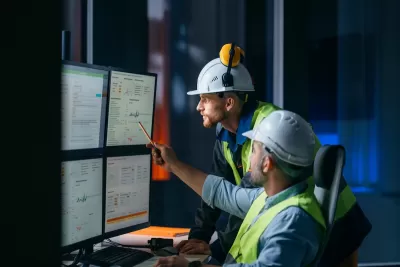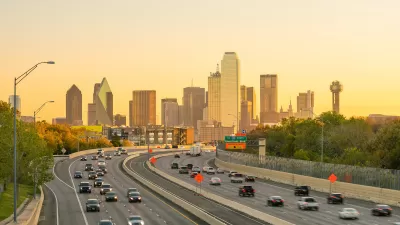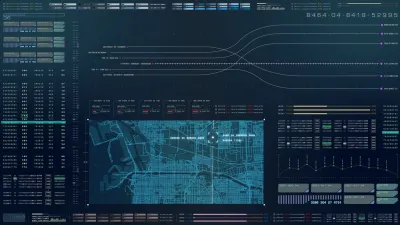Explore how artificial intelligence optimizes municipal services, enhancing efficiency in urban planning, traffic management, and public safety.

With the advancement of artificial intelligence (AI), cities and local governments have the opportunity to maximize their operations through data-driven insights. Urban planners no longer have to rely on manual data entry, for AI offers real time analysis to expand operations — and predict the future.
How can AI make city management more effective?
AI tools and platforms can analyze data from various fields, maximizing the potential of government services and operations. AI enables municipalities to:
Increase energy efficiency
City governments are using AI to develop more energy-efficient infrastructure, which benefits the environment, population, and local economy. With AI, municipalities can use smart grid systems with advanced sensors to collect data and adjust street lighting, HVAC systems, and more.
Improve service delivery
AI provides real-time data access, allowing municipalities to save time and money on service delivery. Algorithms have simplified services like waste management by forecasting trash generation trends and helping city governments implement plans and resources effectively. AI technology also optimizes service experience, allowing users to view current information about their payment options, billing history, and more.
Optimize resource allocation
Through AI’s real-time data, governments can discern what services are doing well and which ones need additional resources. AI can analyze patterns and make predictions, informing leaders what areas will need funds and ensuring accurate use of taxpayer dollars.
Automate routine tasks
Before AI, government employees collected and managed data manually, allowing for human error and inefficient time management. AI can handle repetitive tasks like data entry and application processing, eliminating on-premise infrastructure costs and increasing operational efficiency.
Specific AI applications
The potential of AI technology grows each day, leading to discoveries and uses of real-time data. Cities can apply AI to many areas, from transportation to customer service and everything in between.
Traffic management systems
AI improves many aspects of city transportation, including traffic patterns. AI traffic sensors can predict vehicle safety hazards, assist fire truck and ambulance movement, and reduce congestion. Many cities are experimenting with traffic management systems, including Pittsburgh. It implemented an AI-powered, adaptive traffic signal control system, which has reduced travel times by approximately 25 percent and idling time by 40 percent.
Predictive maintenance tools
AI’s use of data forecasting enables public infrastructure to make early, knowledge-based decisions. Its ability to consume and analyze such sizable real-time datasets allows it to predict many future outcomes, including traffic patterns, population growth, and areas in need. Human labor and data analysis aren’t needed with predictive maintenance tools, reducing labor costs by 60% and minimizing unplanned downtime.
AI-driven platforms
Generative AI platforms streamline citizen interactions with government services, increasing customer satisfaction and maximizing efficient communication. ChatGPT, a form of generative AI, can answer and address resident questions, reducing human time spent answering frequently asked questions. ChatGPT can generate detailed responses of up to 25,000 words in seconds and provides 24/7 service.
The challenges of implementing AI
Although AI provides many positive services and insights, it comes with concerns. Like any advanced technology, AI must be used correctly to avoid issues with:
Data privacy
Privacy and data exposure are primary concerns regarding AI. Platforms like ChatGPT replicate human response patterns and characteristics, meaning users are more inclined to share personal information that could be released. Security isn’t guaranteed with AI, as technology is subject to cyberattacks and data breaches, meaning data doesn’t always stay private.
Cross-departmental collaboration
Enforcing collaboration when implementing new technologies and updating infrastructure can be challenging. Without specific laws and guidelines, different departments can use AI in their own way. Lack of code across departments could cause poor communication and workflow management, scheduling issues and leadership tension.
AI increases city government potential
The power of AI enables urban planners and local leaders to take services and operations to the next level. Advanced data analytics contributes to the success of cities worldwide and will only continue to expand its reach.

Alabama: Trump Terminates Settlements for Black Communities Harmed By Raw Sewage
Trump deemed the landmark civil rights agreement “illegal DEI and environmental justice policy.”

Planetizen Federal Action Tracker
A weekly monitor of how Trump’s orders and actions are impacting planners and planning in America.

Why Should We Subsidize Public Transportation?
Many public transit agencies face financial stress due to rising costs, declining fare revenue, and declining subsidies. Transit advocates must provide a strong business case for increasing public transit funding.

Understanding Road Diets
An explainer from Momentum highlights the advantages of reducing vehicle lanes in favor of more bike, transit, and pedestrian infrastructure.

New California Law Regulates Warehouse Pollution
A new law tightens building and emissions regulations for large distribution warehouses to mitigate air pollution and traffic in surrounding communities.

Phoenix Announces Opening Date for Light Rail Extension
The South Central extension will connect South Phoenix to downtown and other major hubs starting on June 7.
Urban Design for Planners 1: Software Tools
This six-course series explores essential urban design concepts using open source software and equips planners with the tools they need to participate fully in the urban design process.
Planning for Universal Design
Learn the tools for implementing Universal Design in planning regulations.
Caltrans
Smith Gee Studio
Institute for Housing and Urban Development Studies (IHS)
City of Grandview
Harvard GSD Executive Education
Toledo-Lucas County Plan Commissions
Salt Lake City
NYU Wagner Graduate School of Public Service






























